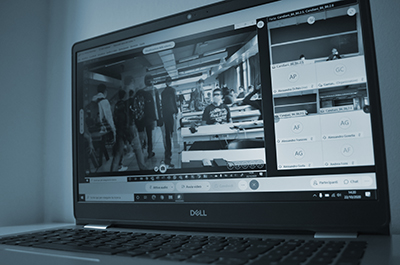
Digital and blended learning have been keywords of this first month since the beginning of all university activities in the middle of a public health emergency. Even during the pandemic and as long as possible, allowing our students to live the University experience – for as long as possible – has always been our ultimate goal. All our efforts were put in trying to merge the lectures as we know them with the best new technologies have to offer.
An open invitation to go “back to university” was sent out directly by the rector Ferruccio Resta, that in a letter addressed to all students wrote: "Politecnico has immediately expressed the will to hold face-to-face lectures, exams, and graduation days starting this semester so that the university would never turn into just a mere teaching institution. On the contrary, as you must very well know, the university is a place where people grow personally and professionally as individuals and as a community".
All Professors have accepted this challenge despite all difficulties and problems brought by having half of the students in class and half online. Reaching this new organization took to completely change our timetables, to rethink the way we deliver theoretical and practical lectures, as well as updating all teaching contents. Eventually, the results paid the hard work off: more than 70% of freshmen attended on campus the first-month lectures. However, the percentage of older students attending the lectures on campus is way lesser. According to the survey to which responded more than 11 thousand students carried out by the School of Industrial and Information Engineering, they claimed that attending online is very efficient - also considering their last-spring experience. The students who decided to hear the lectures via distance learning are international students unable to leave their home country due to force majeure and commuters – the further they live, the higher the percentage.
It is with this in mind that we did our best to host the latest graduation days on campus. In each hall for 200 people were allowed inside only the graduate, 3 friends or family members, and the Examination Board. Left-out friends and family still had the chance to attend online. Despite new healthcare rules, graduates had the pleasure to present their work in front of the Examination Board and to celebrate the end of this journey right where it began. However, students are still paying the price for the pandemic. Even though they claim to be satisfied with how Politecnico di Milano is handling this Covid19 situation by implementing distance learning, students are fully aware of what they are missing out in terms of relationships because of not spending enough time on campus anymore. About 85% of the students state they are losing so much for not confronting themselves with their colleagues. More precisely, about 70% of the students miss campus life, the occasions to build a relationship with their Professors, working on projects, or carrying out lab activities with their peers.
Meanwhile, this experience has helped to raise awareness among teachers and students about the importance of rethinking the teaching activities: this will turn out to be the perfect starting point to adapt the university to the new post-pandemic situation. And, as we recently experienced, digitalization will leave a mark, shaping the university of the future. In this direction, all Professors of the Department of Mechanical Engineering - together with other professors of the School - are already working to design a new teaching plan that involves the full implementation of new digital technologies, which will be useful when facing the challenges that will arise once the pandemic will be over.
Besides, what worries everyone the most right now is the exponential rate at which the contagion curve is growing. For now, Politecnico di Milano decided to hold on to blended learning for practical lectures and lab activities but is ready to promptly react if the situation requires to tighten anti-coronavirus measures.
